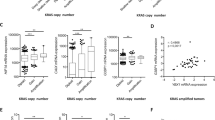Abstract
Functional inactivation of the tsg101 gene in mouse fibroblasts results in cell transformation and the ability to form metastatic tumors in nude mice. The human tsg101 gene was mapped to chromosome 11q15.1-2 and found to mutate in some cancer patients. To test the expression pattern of the tsg101 gene in Chinese breast cancer patients, we analyzed the mRNA by RT-PCR in 51 breast cancer patients. The full-length tsg101 and 7 truncated transcripts were detected in both normal and matched tumor tissues. A short transcript with a deletion of nucleotides 154–1054 is frequently presented in late-stage breast cancers. TSG101 protein expression was also detected by Western blot analysis in 30 breast cancer patients. A predicted full-length 46 kDa and three proteins with smaller molecular weight were detected. The full-length 46 kDa protein was less expressed in tumor specimens. Immunohistochemical stains from 10 patients of each stage 0–4 revealed that TSG101 protein was predominantly present in the cytoplasm. Cell nuclei were occasionally immunopositive and the chromosomes were deeply stained during cell division. The intracellular location and the expression of TSG101 protein were both not stage-dependent in primary breast cancers. In addition, normal mammary glands were more homogenously immunopositive than invasive ductal carcinoma. These results support the notion that the aberrant expression of TSG101 in breast cancer is associated with altered cell growth.
Similar content being viewed by others
erences
Li L, Cohen SN: tsg101: a novel tumor susceptibility gene isolated by controlled homozygous functional knockout of allelic loci in mammalian cells. Cell 35: 319–329, 1996
Maucuer A, Camonis JH, Sobel A: Stathmin interaction with a putative kinase and coiled coil-forming protein domains. Proc Natl Acad Sci USA 92: 99–108, 1995
Hanash SM, Strahler JR, Kuick R, Chu EH, Nichols D: Identification of a polypeptide associated with malignant phenotype in acute leukemia. J Biol Chem 263: 12813–12815, 1998
Sobel A: Stathmin: a relay phosphoprotein for multiple signal transduction? Trends Biochem Sci 16: 301–305, 1991
Brattsand G, Roos G, Marklund U, Ueda H, Landberg G, Nanberg E, Sideras P, Gullberg M: Quantative analysis of the expression and regulation of an activation-regulated phosphoprotein (oncoprotein 18) in normal and neoplastic cells. Leukemia 7: 569–579, 1993
Roos G, Brattsand G, Landberg G, Marklund U, Gullberg M: Expression of oncoprotein 18 in human leukemias. Leukemia 7: 1538–1546, 1993
Koonin EV, Abagyan RA: TSG101 may be the prototype of a class of dominant negative ubiquitin regulator. Nat Genet 16: 330–331, 1997
Li L, Li X, Francke U, Cohen SN: The TSG101 tumor susceptibility gene is located in chromosome 11 band p15 and is mutated in human breast cancer. Cell 88: 143–154, 1997
Li L, Francke U, Cohen SN: The TSG101 tumor susceptibility gene is located in chromosome 11 band p15 and is mutated in human breast cancer. Cell 93(4): following, 1998
Winqvist R, Mannermaa A, Alavaikko M, Blanco G, Taskinen PJ, Kiviniemi H, Newsham I, CaveneeW: Refinement of regional loss of heterozygosity for chromosome 11p15.5 in human breast tumors. Cancer Res 53: 4486–4488, 1993
Steiner P, Barnes DM, Harris WH, Weinberg RA: Absence of rearrangements in the tumour susceptibility gene TSG101 in human breast cancer. Nat Genet 16: 332–333, 1997
Lee MP, Feinberg AP: Aberrant splicing but not mutation of tsg101 in human breast cancer. Cancer Res 57: 3131–3134, 1997
Gayther SA, Barski P, Batley SJ, Li L, De Foy K AF, Cohen SN, Ponder BAJ, Caldas C: Aberrant splicing of the TSG101 and FHIT gene occurs frequently in multiple malignancies and in normal tissues and mimics alternations previously described in tumours. Oncogene 15: 2119–2126, 1997
Zhong Q, Chen CF, Chen Y, Chen PL, Lee WH: Identification of cellular TSG101 protein in multiple human breast cancer cell lines. Cancer Res 57: 4225–4228, 1997
Zhong Q, Chen Y, Jones D, Lee WH: Perturbation of TSG101 protein affects cell cycle progression. Cancer Res 58: 2699–2702, 1998
Xie W, Li L, Cohen SN: Cell cycle-dependent subcellular localization of the TSG101 protein and mitotic and nuclear abnormalities associated with TSG101 deficiency. Proc Natl Acad Sci USA 95: 1595–1600, 1998
Beahrs OH, Henson DE, Hutter RVP, et al. (eds): American Joint Committee on Cancer: manual for staging of cancer, 4th edn, Philadelphia: JB Lippincott, 1992, p. 149
Chomczynski P, Sacchi N: Single step-method of RNA isolation by acid guanidinium thiocyanate-phenol-chloroform extraction. Anal Biochem 162: 156–159, 1987
Lin PM, Liu TC, Chang JG, Chen TP, Lin SF: Aberrant TSG101 transcripts in acute myeloid leukemia. Br J Haematology 102: 753–758, 1998
Oh Y, Proctor ML, Fan YH, Su LK, Hong WK, Fong KM, Sekido YS, Gazdar AF, Minna JD, Mao L: TSG101 is not mutated in lung cancer but a shortened transcript is frequently expressed in small cell lung cancer. Oncogene 17: 1141–1148, 1998
Hampl M, Hampl J, Plaschke J, Fitze G, Schackert G, Saeger HD, Schackert HK: Evidence that TSG101 aberrant transcripts are PCR artifacts. Biochem Biophys Res Commun 248: 753–760, 1998
Author information
Authors and Affiliations
Rights and permissions
About this article
Cite this article
Lo, YF., Chen, TC., Chen, SC. et al. Aberrant expression of TSG101 in Taiwan Chinese breast cancer. Breast Cancer Res Treat 60, 259–266 (2000). https://doi.org/10.1023/A:1006426400524
Issue Date:
DOI: https://doi.org/10.1023/A:1006426400524




